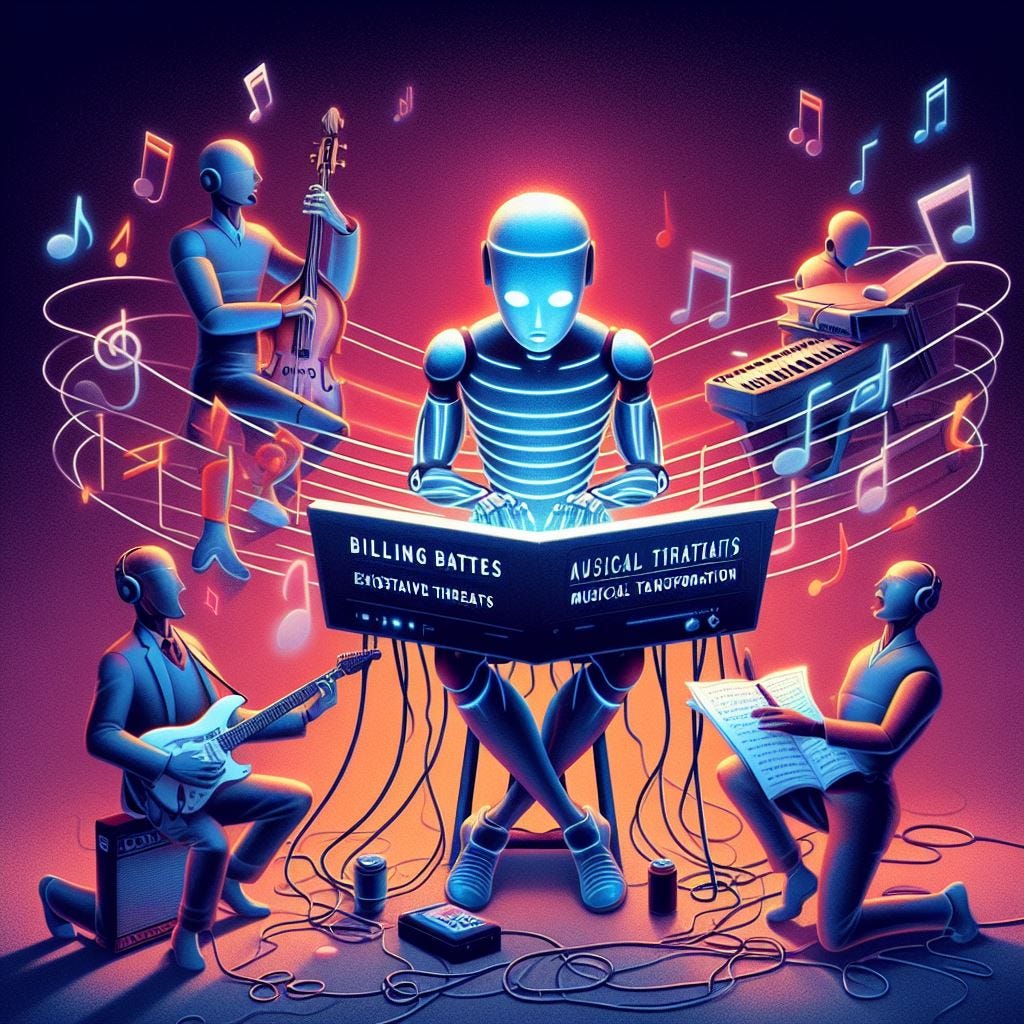AI in 2024: Billing Battles, Existential Threats, and Musical Transformation
How Artificial Intelligence Will Revolutionize Medicine, Endanger Humanity, and Disrupt the Music Industry in the Coming Year
The AI Arms Race Over Medical Billing
- As hospitals, insurers, and government agencies adopt AI to process $4 trillion in annual medical expenses, an "arms race" has emerged
- Providers want AI tools to maximize revenue through aggressive billing coding, while payers want AI to detect fraud and reduce costs
- This risks inflaming existing billing disputes and harming patients caught in between
- Both sides argue AI could still yield efficiencies and benefit consumers
- Policymakers are just starting to evaluate oversight, with little Congressional action so far
- With billions at stake from AI adoption, the accelerated timeline and lack of safeguards could further entrench misaligned incentives in the system
The Looming Dangers of AI in 2024
- In 2024, AI deepfakes may advance enough to influence elections through realistic forged videos
- An AI technique called “surrealism” can already make fake content seem more real than the genuine article
- Lethal autonomous weapons like drones and submarines could go mainstream as nations pursue an AI arms race
- An AI system called Q* embodying human-level general intelligence across contexts may emerge
- While its existence is unconfirmed, experts predict artificial general intelligence (AGI) could soon appear
- Whether manipulating media, replacing soldiers, or transcending human capabilities, AI in 2024 may enable unprecedented harms
HEADLIME IS THE GO-TO GPT-3 TOOL FOR MARKETERS.
WRITESONIC IS ONE OF THE BEST ARTIFICIAL INTELLIGENCE-POWERED COPYWRITING GPT-3 TOOLS.
Three Music AI Advancements to Expect in 2024
- Source separation AI could achieve flexible, prompt-based controls and real-time speeds useful commercially
- Universal music embeddings capturing semantic meaning may emerge from large datasets
- Progress bridging the gap between AI research and practical use through understanding industry needs, developing robust products, addressing legal and ethical concerns, securing funding, and spreading awareness
- While hype is high, managing expectations is wise as some ideas will fail
- But the stage is set for a historic 2024 cementing AI’s influence on music creation and consumption
- Key milestones around flexible source separation, general embeddings, and bridging research to products could make 2024 a tipping point
The AI Arms Race Over Medical Billing
As hospitals, insurers, and the government adopt artificial intelligence to process the nation's $4 trillion in annual medical expenses, an arms race has emerged. Providers want AI tools to maximize revenue by aggressively coding bills, while insurers and government agencies want to leverage the technology to detect fraud and curb costs. This conflict threatens to exacerbate existing billing disputes to the detriment of patients. However, both sides argue AI could still benefit consumers by improving efficiency. Meanwhile, policymakers are just beginning to evaluate appropriate safeguards, with little Congressional action so far besides initial hearings and proposals. With billions at stake, rapid AI adoption seems imminent regardless. This accelerated timeline and lack of oversight risks further entrenching a system with misaligned financial incentives, potentially resulting in denied claims, surprises bills, and higher premiums for Americans unless regulators keep pace. For now, it appears AI will intensify existing tensions around medical billing rather than resolve them.
The Looming Dangers of AI in 2024
In 2024, artificial intelligence could reach several alarming milestones that threaten privacy, democracy, and even human control. AI deepfake technology may advance enough to sway elections through realistic forged videos. An AI technique called "surrealism" can already make fake content seem more real than the genuine article. Lethal autonomous weapons like drones and submarines could also go mainstream as nations engage in an AI arms race. Most chilling is a hypothetical AI system called Q* that embodies artificial general intelligence surpassing human capabilities across contexts. While its existence is unconfirmed, experts predict AGI could soon emerge. Whether manipulating videos, replacing soldiers, or transcending human intelligence, AI in 2024 could enable previously unfathomable harms. Absent oversight and safeguards, next year may mark a point of no return for this potentially dangerous technology.
The Minds Behind Controversial AI Startup ElevenLabs
ElevenLabs, an AI startup making waves with its viral voice cloning software, was created by founders Piotr Dabkowski and Mati Staniszewski. Dabkowski, a former Google engineer skilled in machine learning, brings technical prowess. Staniszewski has a background in corporate strategy from data analytics firm Palantir. Together, they have attracted venture capital investment and over 1 million impressed users. However, ElevenLabs has also sparked ethical concerns about misusing such accurate voice mimicry to spread misinformation. Critics like philosopher Susan Schneider warn it threatens truth in the digital age. While ElevenLabs says it wants to advance voice tech ethically, paying voice actors and enabling user-designed voices, critics remain wary of the implications. With influential backing but controversial capabilities, all eyes are on ElevenLabs' founders as they shape the future of AI voice synthesis. Their innovation could revolutionize communication or undermine truth—only time will tell.
Three Music AI Advancements to Expect in 2024
After a breakthrough year for music AI in 2023, more innovations are on the horizon in 2024. First, source separation algorithms for splitting songs into isolated instrument tracks may achieve flexible, prompt-based controls and real-time speeds useful for commercial applications. Second, universal music embeddings capturing semantic meaning could emerge from large datasets, enabling intuitive music search, recommendations, and efficient machine learning models. Finally, maturing the field overall by bridging research and practical use through understanding industry needs, developing robust products, navigating legal concerns, securing funding, and spreading awareness. While hype is high, managing expectations is wise - some ideas will fail. But 2023 set the stage for a historic 2024 cementing AI's influence on music creation and consumption. We may see AI transition from novel demos to adopted tools integrated across the musical landscape. Key milestones around flexible source separation, general embeddings, and bridging research to products could make 2024 a tipping point for music AI.










